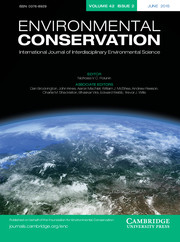Carsten Mann and Arno Simons have pu blished a new paper entitled “Local emergence and international developments of conservation trading systems: innovation dynamics and related problems” in Environmental Conservation (2014). You can read the full article on the Journal website (pay-walled). For more information see also the summary below.
blished a new paper entitled “Local emergence and international developments of conservation trading systems: innovation dynamics and related problems” in Environmental Conservation (2014). You can read the full article on the Journal website (pay-walled). For more information see also the summary below.
Summary
Conservation trading has developed as a policy instrument for biodiversity protection. This paper traces the emergence, development, and spread of conservation trading, focusing particularly on the formation and activities of an increasingly transnational policy instrument constituency, namely the actor group that has formed around the policy instrument in its support. The development of conservation trading was predominantly guided by a constituency of dominant business-oriented actors, beginning with mitigation measures in the USA and making later connections to international networks with a similar market-driven orientation for environmental protection. By strategically combining agenda-driven research with the mobilization of political support, this constituency helped to establish conservation trading as a widely acknowledged policy solution applicable to various ecological and sociopolitical contexts. Yet, this was achieved, in part, at the cost of neglecting critical issues, such as the recognition of policy alternatives or socioecological or cultural context particularities. Whereas the development of conservation trading is sometimes portrayed as a rational process of neutral policy learning, this process, through its constituency, has developed a life and political momentum of its own, which must be acknowledged when engaging with the design and implementation of better conservation policies. A forward-looking social policy assessment approach is required, which opens up policy design discourses for debate and reflexive engagement. Acknowledging possible shortcomings with a broad range of concerned societal actors can help to assure policy transparency, add specificity, and increase the sound ecological and societal embedding of conservation trading.
